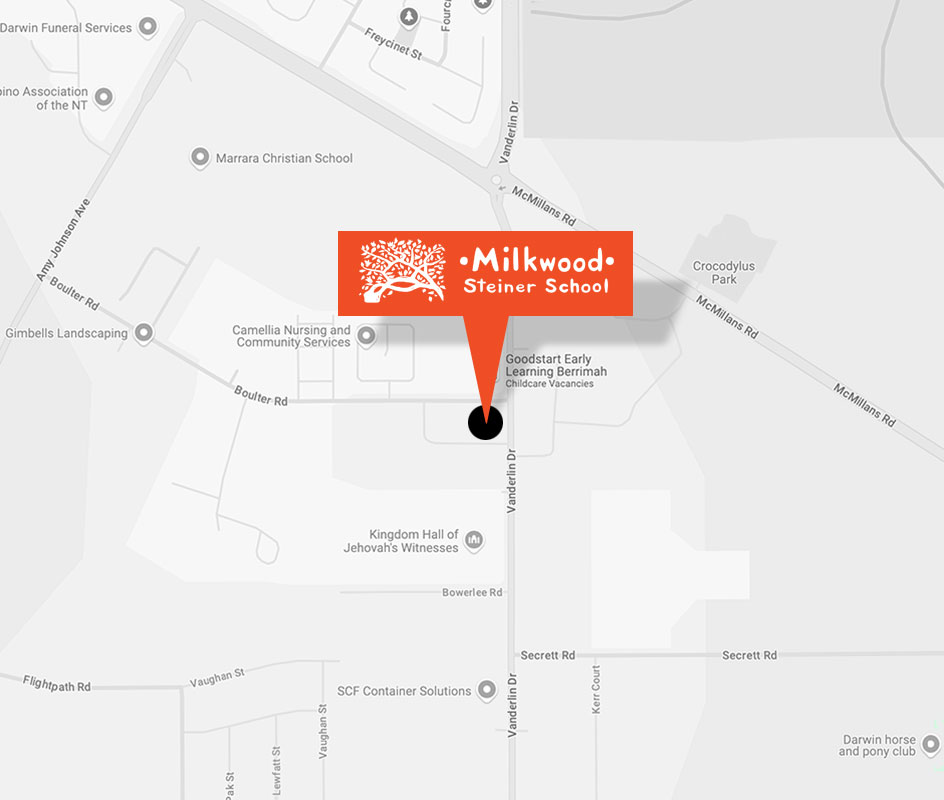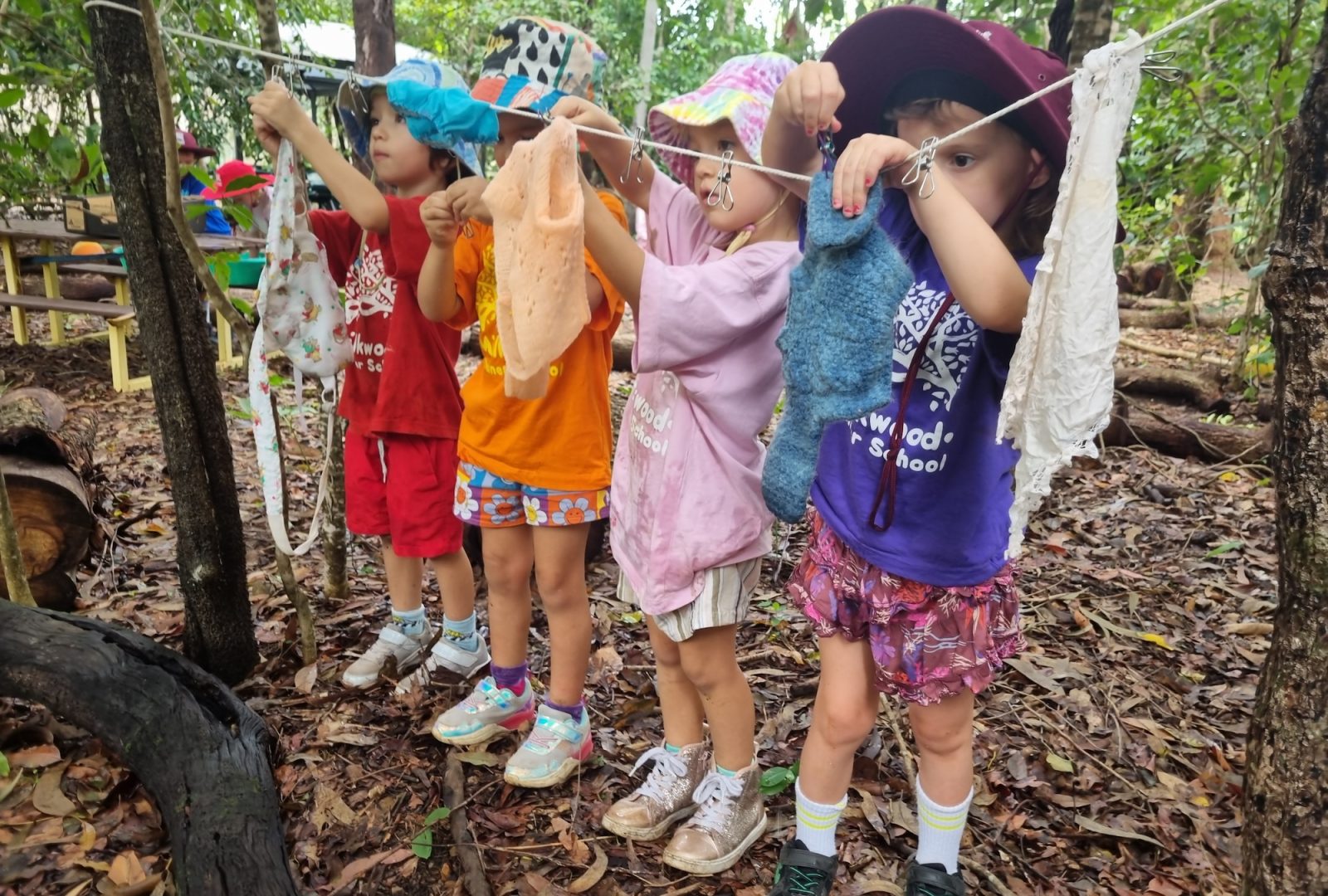Kindergarten
Steiner Early Childhood Education recognises that children are learning all the time. Children under the age of seven are expert imitators, so the most important role of the Kindergarten physical and social environment is to model a healthy, kind and holistic model of living, being and relating, that is worthy of replication. The Kindergarten is a home-like environment, where children engage deeply in the rich domestic tasks of growing food, cooking, craft, time in nature, rest and play. The beautiful physical environment of the Kindergarten is guided by a principle that “what I touch touches me”; the materials for work and play are open ended, sustainable and purposeful. Play is the most important work of the Kindergarten.
Milkwood Steiner School offers Kindergarten for two age groups.
Bush Apple Kindergarten is for children who are 4 turning 5 sometime in the year. They attend five days a fortnight.
Water Lily Kindergarten is for children who are 5 and will turn 6 sometime in the school year and is compulsory for all Northern Territory children. These children attend 5 full days a week.
Activities are based around the homelike environment of the Kindergarten, such as gardening, baking, painting or simple handcraft. Stories, songs and verses are chosen to harmonise with the season and the rhythm of the day. The Kindergarten is a beautiful and secure sanctuary, in which the children can begin their journey into the wider world. In Steiner education, the day is usually divided into three parts and activities are repeated over three or more days. Typically the same circle games, rhymes and story will be told each morning for the full week. For young children, activities requiring concentration and will, such as stories, plays, poems, songs and rhymes, are taught in the morning. Activities that evoke the feelings such as painting and music are taught mid-morning and activities that require less concentration such as games and walks are taught in the afternoon. These afternoon activities bring the group together, teaching social skills such as sharing, cooperation and patience. They also begin the teaching of observation and wonder which are built on in later years by science and nature study classes.
In the early years, days are known by the children as ‘walk day’, ‘painting day’, and so on. Teachers recognise that these rhythms help to maintain health and well-being. Imitation, imagination and rhythm are the key words in Steiner education in early childhood.
The following three statements can sum up our approach to early childhood education:
- Imitation of adult role models who are engaged in wholesome activities and work develops gross and fine motor skills and provides a sound basis for confidence in self and trust in the world.
- A sense of wonder is cultivated through activities in nature. Celebration of seasonal festivals fosters enthusiasm for learning and life-long moral strength.
- Imagination in play, dramatisation and artistic work provides the first step of a cognitive process that is furthered through the academic work of the elementary school. Much genius originally springs from the fantasy and imagination of individuals whose creative thinking enables them to visualise how things are and also how they might be.
While the Kindergarten curriculum does not emphasise academic learning, it prepares children for academic learning in many important ways:
- Foundation for language arts: Broad fundamental work in listening and speaking skills, including singing, proper pronunciation, rhymes that form the later basis of word families, poems, listening to and comprehending stories, which also provide vocabulary enrichment.
- Foundation for mathematics: Broad work in developing gross motor skills, graceful movement, balance, coordination, and dexterity in fingers and limbs; imaginative play with simple objects provides the basis for abstract manipulation of symbols in school.
- Artistic training: Beeswax modeling, watercolor painting, music, singing and Eurythmy and simple dramatizations.
- Social skills: Learning to live, work and play in a group, sharing and taking turns; practicing common courtesy and politeness.
- Work habits: Learning to complete tasks, helping to clean up after themselves and working within the gentle structure provided by the daily rhythms of similar activities.
For Kindergarten, this is the beginning of their journey as members of a social group. There is so much to learn! This is a time of figuring out that there are others who have a different perspective than they do, a time of learning how to share, a time of figuring out how to play successfully with different children, and a time of feeling comfortable and safe in someone else’s care besides their families. All children have their own way of greeting the world around them and it is our intent to lovingly guide and help each child become more comfortable and skilled at being with others. This may be through a redirection of their activity or energy, helping them express through words their emotions (especially the older ones), or giving them an activity away from others such as helping the teacher do a task, so that they can collect themselves to be able to happily play again.
The children begin to know the importance of three things: respecting and being kind to others, respecting and being patient with one’s self, and respecting the materials we use in the world around us.




